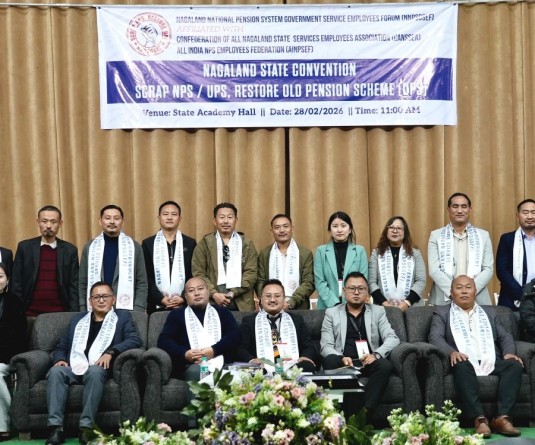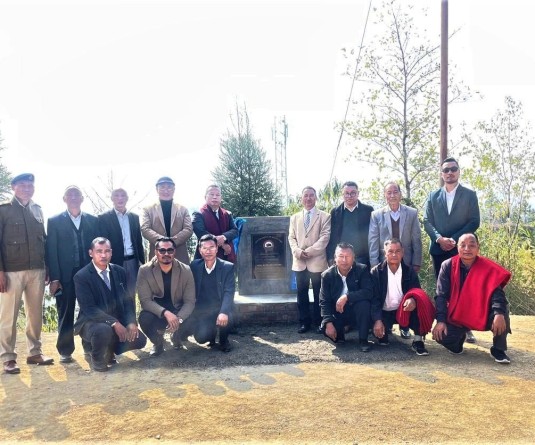
Chizokho Vero
Kohima | May 25
The farming community in Nagaland has a great reason to rejoice as the process for launching of National Mission on Micro Irrigation from this year has finally started in the state.
As a start, a state level awareness- cum-training programme on micro irrigation took place here in the presence of experts and officials from Ministry of Agriculture, New Delhi and National Committee on Plasticulture Application in Horticulture, New Delhi.
Parliamentary secretary for horticulture R. Khing told the gathering that with the declaration of 2012 as “Year of Horticulture” by Government of India, there has been planned for the state of Nagaland to promote technology like micro irrigation in horticulture sector to enhance production. He said that considering the every increasing and ever increasing requirement of food items to meet the demand, it is very alarming to know that water is becoming a scarce commodity day by day. There now appears to be a strong contest for water amongst different activities of human being such as construction, manufacturing of commodities, domestic uses, sanitations, cultivation of food crops, rearing of animals and birds etc.
He said the biggest question remains to be answered is how efficiently the available water can be used to produce sufficient food items. And when it comes to efficient use of already scare water, perhaps, there are no other options available except the technology we have today in the form of different techniques and systems of micro irrigation whether it be Sprinkler, Drip, Micro Drip, Misters or foggers. The Ministry of Agriculture, Government of India having fully realized the importance of efficient use of available water, launched a country wide programme on micro irrigation to be implemented on a mission mode namely National Mission on Micro Irrigation (NMMI) which is aimed at minimum but efficient use of water and at the same time increase crop production, Khing said.
Although Nagaland falls under heavy rainfall zone where annual rainfall sometimes may record upto 2000mm, the trend of the rainfalls and the period of the rain and thus the water availability do not guarantee a good crop, he said adding this is more so in the case of horticultural crops which need water at certain critical stages of their growth for quality and optimum production.
“I am fully confident that the programme implementation in the state although a late starter as compared to other states will take off on technical and scientific way to benefit the farming community in particular and the state as a whole,” he said.
Khing also appealed to all allied departments to avail the mission programme as the scheme is not for the department of horticulture alone but for all the departments that are implementing horticultural and agricultural crops. “I am however constrained to mention that the state’s farmers due to low purchasing power will be unable to pay the 40% of the system costs as farmers share which is likely to make the technology less receptive although beneficial,” he said and appealed to the Ministry of Agriculture to rethink on reducing the farmers share to enable the farmers to avail the given opportunity.
Commissioner & secretary horticulture and SMIC Nagaland chairman Sentiyanger Imchen maintained that the state has made rapid progress in agri and allied especially in horticulture.
He said the challenges today are to increase productivity and micro irrigation is going to play a vital role.
Delivering keynote address, Naresh Modi, senior project officer, NCPAH, Ministry of Agriculture said that water is one of the most critical inputs for agriculture. The availability of adequate water for irrigation is a key factor in achieving higher productivity.
However the poor efficiency of conservational irrigation systems has not reduced the anticipated outcome of investments towards water resource development, but has also resulted in environmental problems like water logging and soil salinity, thereby adversely affecting crop yields. He said that it is expected that adoption of improved methods of irrigation such as drip and sprinkler would not only save water, power, fertilizer consumption, weeding cost, etc but would also mitigate environmental degradation such as water logging and soil salinity. Modi also announced that the team will be pleased to hold awareness programme and demonstration on the application of micro irrigation in all the district headquarters for adoption and popularization of the technology.
Dr. Benjong Aier, additional director horticulture & Mission Director (HMNEH said Micro-irrigation in Nagaland was started from 2001-02 under HTM-NE and in the beginning the scheme could not be taken up successfully due to lack of technical knowledge. However, he said, with the awareness programme and number of trainings given under NCPAH (National Committee on Plasticulture Applications in Horticulture) through AAU, Jorhat (PFTC) and other parts of the country, a lot of awareness was created amongst the progressive farmers, especially in fruits, vegetables and flowers, he added. He also said that Micro-irrigation had a tremendous impact on various farmers in all the districts of Nagaland, particularly in Mokokchung, Peren and Wokha districts, where micro-irrigation was adopted from seedling stage to orchard cultivation in orange, banana, vegetables and flowers. He said, the areas under Micro-irrigation are bound to increase manifold under the current initiatives and schemes on micro irrigation under NCPAH.
During the last 3-4 years, micro irrigation was predominant in protected cultivation for cut flowers vegetables and citrus nurseries. He also informed that the progressive farmers of the state have visited neighbouring North-Eastern States to get first hand information and exchange views with other farmers and are successfully implementing these ideas along with micro irrigation in their respective farms.





.jpg)
